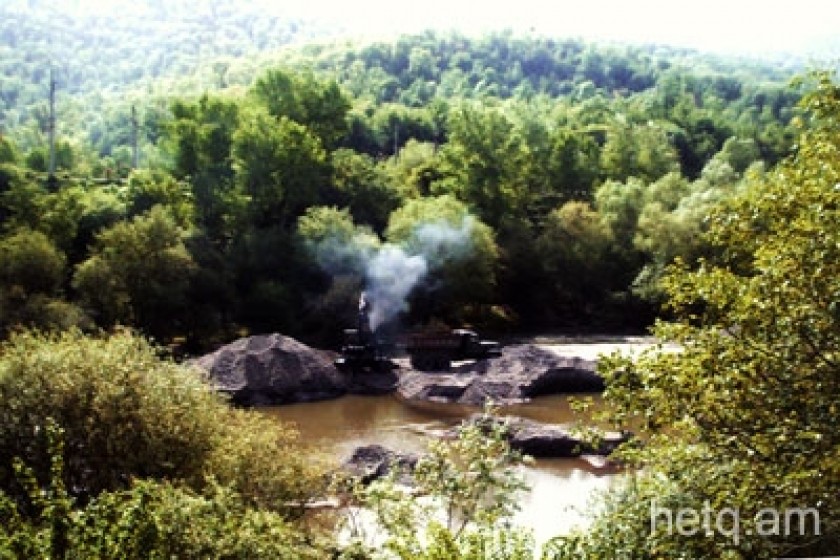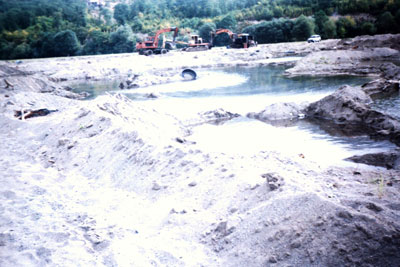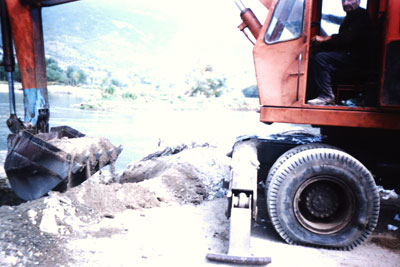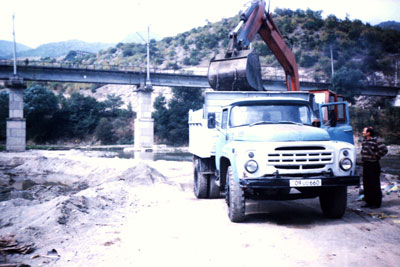
Who is Pocketing the Profits from the Sand Mine?
Some twenty years ago the White Water reservoir, built along the Aghstev Riverat the southern entrance to the town ofIjevan, was put into operation. Local poets and news reporters soon began to describe the artificial lake as the beauty of the Aghstev valley. The reservoir has a capacity of 4 million cubic meters. The spring floods fill the reservoir with large amounts of sand and pebbles.
Nearly half of the mirror-like surface of the White Water Lake has been filled in as a result. Small peninsulas and islets have been created due to the accumulating sand deposits. Conservative estimates place the size of the sand/pebble deposits at around 2 million cubic meters.
The length of the lake stretches along the main highway to Yerevan and thousands of motorists daily see the sand being extracted. For the past several years huge excavators and cranes have been working at the site. Due to the construction boom in the Ijevan and Dilijan districts there is a great demand for sand. A driver who transports sand from here to Dilijan confirmed that they are paying 8,000 drams to load a dump truck full of lake sand. Trucks with larger carrying capacity can be paid up to 20,000 drams per load. Who are the ones profiting from the resources of the reservoir and who, arguing that they are cleaning away the sediment, are reaping in illegal and non-taxed income?
 According to our information, this business operation is under the control of Varujan Nersisyan, the Mayor of Ijevan. To confirm this in October 2007 I applied in writing to the Prosecutor’s Office of the Tavush Marz. In a reply I received dated October 22, 2007 and signed by the Senior Prosecutor of Tavush, V. Arakelyan, it states, “An investigation of the issue regarding the illegal use of sand from the White Water reservoir that you raised in your letter addressed to the Tavush Prosecutor’s Office was conducted. The investigation concluded that improvements are being made to the town parklands and certain buildings are being erected there, work that requires the leveling of two hectares of green space with silt so that lawn grass can be laid down. As noted in the memorandum we received from the Mayor’s Office, only silt is being transported from the above-mentioned lake to level off the park of the Mayor’s Office. Sand form the lake has not and will not be used for this purpose. If credible evidence exists regarding the illegal use of sand by the Mayor’s Office you can present such material to either the Ijevan Police Department or the Regional Prosecutor’s Office.
According to our information, this business operation is under the control of Varujan Nersisyan, the Mayor of Ijevan. To confirm this in October 2007 I applied in writing to the Prosecutor’s Office of the Tavush Marz. In a reply I received dated October 22, 2007 and signed by the Senior Prosecutor of Tavush, V. Arakelyan, it states, “An investigation of the issue regarding the illegal use of sand from the White Water reservoir that you raised in your letter addressed to the Tavush Prosecutor’s Office was conducted. The investigation concluded that improvements are being made to the town parklands and certain buildings are being erected there, work that requires the leveling of two hectares of green space with silt so that lawn grass can be laid down. As noted in the memorandum we received from the Mayor’s Office, only silt is being transported from the above-mentioned lake to level off the park of the Mayor’s Office. Sand form the lake has not and will not be used for this purpose. If credible evidence exists regarding the illegal use of sand by the Mayor’s Office you can present such material to either the Ijevan Police Department or the Regional Prosecutor’s Office.
 First of all it is interesting to note how the municipal park in Ijevan is described as belonging to the Mayor’s Office and not to the community. The Tavush Regional Prosecutor’s Office has failed to investigate what is taking place daily, literally under its nose just a few kilometers away. It chooses instead to take the assurances of the Mayor’s Office at face value. These assurances though can be refuted based on the official information received from the Mayor’s Office itself. Here are some figures regarding the use of sand to fill out the two hectares of green space. Just before the Ijevan mayoral elections that took place on December 16, 2007, the Mayor’s Office published an advertising edition to its “Ijevan” newspaper. That edition had the following to say about the building program on the town parkland, “As a result of the cooperation between World Vision and the Mayor’s Office the park has been laced with grass strips, leveled off and a landscaped with a green lawn. The total cost of the project was 7.2 million drams. The Municipality kicked in 2 million drams towards labor salaries. 1,500 cubic meters of dirt was trucked in as filler material and grass seed was planted over some 4,000 square meters.”
First of all it is interesting to note how the municipal park in Ijevan is described as belonging to the Mayor’s Office and not to the community. The Tavush Regional Prosecutor’s Office has failed to investigate what is taking place daily, literally under its nose just a few kilometers away. It chooses instead to take the assurances of the Mayor’s Office at face value. These assurances though can be refuted based on the official information received from the Mayor’s Office itself. Here are some figures regarding the use of sand to fill out the two hectares of green space. Just before the Ijevan mayoral elections that took place on December 16, 2007, the Mayor’s Office published an advertising edition to its “Ijevan” newspaper. That edition had the following to say about the building program on the town parkland, “As a result of the cooperation between World Vision and the Mayor’s Office the park has been laced with grass strips, leveled off and a landscaped with a green lawn. The total cost of the project was 7.2 million drams. The Municipality kicked in 2 million drams towards labor salaries. 1,500 cubic meters of dirt was trucked in as filler material and grass seed was planted over some 4,000 square meters.”
 Even those with poor math grades can figure out that 4,000 square meters is five times less than two hectares. But let’s forget those two pesky hectares. Silt, along with sand, can be transported from the river. But hundreds of tons of sand are removed from this site that can’t be “covered over” with silt or mud. In addition, photos show that sand isn’t only being removed from the reservoir but from the banks of the Aghstev River as well.
Even those with poor math grades can figure out that 4,000 square meters is five times less than two hectares. But let’s forget those two pesky hectares. Silt, along with sand, can be transported from the river. But hundreds of tons of sand are removed from this site that can’t be “covered over” with silt or mud. In addition, photos show that sand isn’t only being removed from the reservoir but from the banks of the Aghstev River as well.
On what company’s balance sheet does the White Water reservoir and surrounding lands appear? Has any firm or individual been granted the right to commercially use the sand of the reservoir and if so are taxes in kind being paid to the state coffers? In accordance with Armenia’s “Freedom of Information Act” I forwarded such written inquiries to Ijevan Mayor Varujan Nersisyan, Tavush Regional Governor Armen Ghularyan and the Tavush Regional Office of the State Environmental Inspectorate (SEI). Some twenty days later neither the Regional Governor nor the Ijevan Mayor has seen fit to respond to my inquiries.
Jora Sahabalyan, Head of Tavush Regional Office of the SEI, advised me in writing to take the matter to the Ministry of Nature Protection. I have since done so but have received no response to my written inquiry. A government official with close working ties to the Tavush Office of the SEI, who wished to remain anonymous, told me that last year, as a result of an in-depth investigation conducted by the SEI regarding the illegal extraction of sand from the White Water reservoir, the Ijevan Mayor’s Office was hit with heavy fines. Ijevan Mayor Varujan Nersisyan was away on vacation at the time and it was Deputy Mayor Garen Otaryan who signed off on the penalty notices in his stead.
The State Environmental Inspectorate has initiated legal proceedings on the matter at the Sevan administrative court. But Mayor Varujan Nersisyan isn’t taking the matter lying down. It later was revealed that it wasn’t his Deputy that he selected as temporary Mayor but rather the Municipality’s Secretary Boris Tananyan. Taking this fact into account the court refused to accept the signed penalty papers as evidence and refused to hear the case.
The current leaders of Armenia pontificate about the supremacy of the law, about closing the state budget and the need to fight against the black market while the theft of White Water sand continues in plain sight for all to see. It’s so out in the open that it cannot even be considered a part of the black market economy. All it takes is the desire to see what is actually taking place.
Tavush
 Videos
Videos Photos
Photos
Write a comment